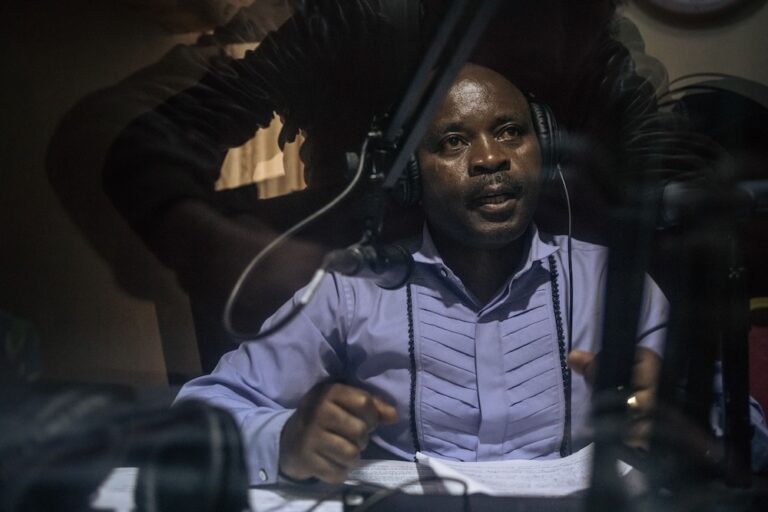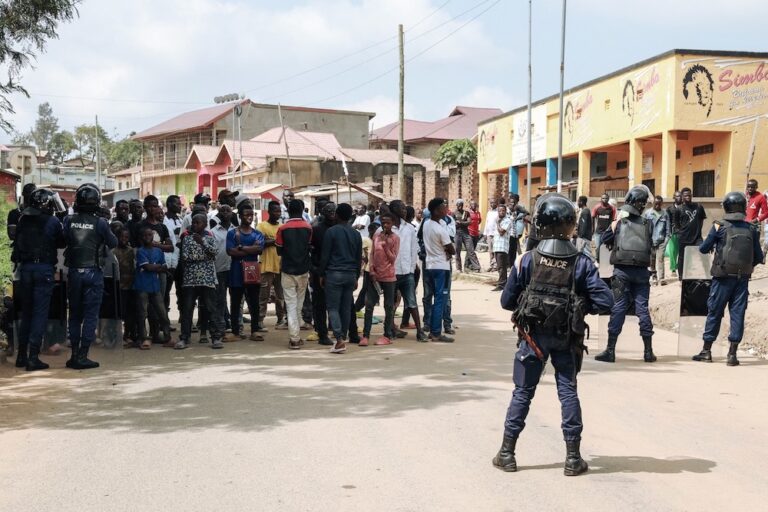(CPJ/IFEX) – The following is a 25 October 2007 CPJ press release: In DRC, TV reporters beaten, 38 broadcasters banned New York, October 25, 2007 – A Congolese government minister invited two television journalists to his office in the capital, Kinshasa, and then ordered police to beat them when they arrived, according to news reports […]
(CPJ/IFEX) – The following is a 25 October 2007 CPJ press release:
In DRC, TV reporters beaten, 38 broadcasters banned
New York, October 25, 2007 – A Congolese government minister invited two television journalists to his office in the capital, Kinshasa, and then ordered police to beat them when they arrived, according to news reports and local press freedom group Journaliste en Danger. The incident came on the heels of a government decree summarily banning 38 private broadcasters over alleged regulatory noncompliance.
Higher Education Minister Sylvain Ngabu ordered policemen to beat news director Heustache Namunanika and cameraman Didier Lofumbwa of private broadcaster Horizon 33 after the station aired a news program discussing Ngabu’s decision to suspend Dieudonné Kalindye, the chancellor of a local university, according to news reports. In the program, shown on October 19, and again two days later, Namunakia raised critical questions about the government’s role in the controversy after interviewing both Ngabu and Kalindye.
Lofumbwa was preparing his camera to film Ngabu when five armed officers assaulted him from behind, using rifle butts to beat him while dragging him out of the office, he told CPJ. He received treatment for bruises and chest pains, according to Namunika, who escaped the beating, but had his clothes torn in the scuffle.
Calls from CPJ to Information Minister Toussaint Tshilombo Send were not immediately returned, but his chief of staff, Faustin Fwafa, said Send “deplored” the incident, adding that a government cabinet meeting would discuss the issue on Friday.
A complaint against Ngabu and the guards for unlawful confinement and assault and battery was filed on the journalists’ behalf on Wednesday, defense lawyer Jean-Pierre Ngunda told CPJ.
“We are outraged that a government minister would lure two journalists to his office with the bait of an interview and then order police to beat them and drag them outside,” CPJ Executive Director Joel Simon said. “It is inconceivable that a democratically elected president such as Joseph Kabila, who meets with President Bush at the White House this week, could sanction such behavior by one of his ministers. We hope that President Kabila will ensure that all those responsible for this brutal attack on Heustache Namunanika and Didier Lofumbwa are brought to justice swiftly.”
Horizon 33 has been off the air since Monday, after Send summarily ordered 22 private television channels and 16 radio stations closed on Saturday over alleged regulatory noncompliance, according to news reports. Fwafa said the broadcasters operated without official authorization or documentation, and were in default of required fees or taxes, he told CPJ. The ban is for an indefinite period, and while several stations report having since paid their dues or submitted required documents they remain shut down.
Several journalists interviewed by CPJ said the ruling came without notice or hearing, denying them the opportunity to address the allegations. Fwafa denied the ban came without forewarning, adding that the government had announced its intent to audit media outlets since March.
“We remind the government that the closing of radio and television stations without due process amounts to censorship,” said Simon. “We call on the government to adhere to due process as guaranteed under the country’s constitution.”
Local journalists told CPJ the ruling was an attempt to intimidate stations close to the opposition just as the government is about to distribute the equivalent of US$2 million in state subsidy funds to the DRC’s impoverished public and private media houses.
The audit has so far only affected commercial broadcasters in Kinshasa, but will continue into the provinces, according to Fwafa. If applied to countryside broadcasters, the audit threatens to silence dozens of community radio and television stations unable to pay regulatory fees, including the 2 million Congolese francs (US$5,000) required for a broadcasting license, according to the Congolese Federation of Community Radios.
CPJ named the DRC this year one of the world’s worst backsliders on press freedom.
CPJ is a New York-based, independent, nonprofit organization that works to safeguard press freedom worldwide. For more information, visit http://www.cpj.org


